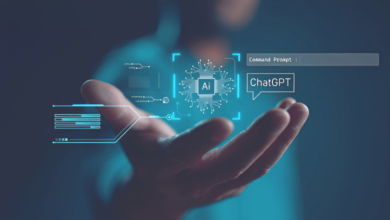Future-Proof Your Career: 5 Tech Skills That Matter Now
Future-proof your career with 5 essential tech skills AI, cybersecurity, data science, and blockchain. Stay competitive in the digital age.

Future-proof your career by mastering the most in-demand tech skills that will keep you relevant in today’s rapidly evolving job market. As artificial intelligence, automation, and digital transformation reshape industries, professionals who adapt and upskill will thrive while others risk being left behind. This article reveals the five essential tech competencies that employers value most from AI and cloud computing to cybersecurity and data science – providing you with a roadmap to career longevity in an increasingly tech-driven world.
The pace of technological change has never been faster, making continuous learning no longer optional but imperative for career survival. Whether you’re just starting out or are a seasoned professional, investing in these future-proof Tech Skills will not only enhance your employability but also position you for higher salaries and leadership roles. By developing expertise in Tech Skills key areas, you’ll gain the competitive edge needed to navigate the job market of tomorrow with confidence and security.
5 Tech Skills That Matter Now
Artificial Intelligence and Machine Learning
Artificial Intelligence (AI) and Machine Learning (ML) are revolutionizing industries, from healthcare to finance. Companies leverage AI to automate processes, analyze big data, and improve decision-making. Understanding AI concepts, neural networks, and predictive modeling can open doors to roles like data scientist, AI engineer, or ML specialist.
Cloud Computing and DevOps
Cloud computing has become the backbone of modern IT infrastructure, with businesses migrating to platforms like AWS, Azure, and Google Cloud. Professionals skilled in cloud architecture, deployment, and security are in high demand. DevOps, which combines software development and IT operations, further enhances efficiency through automation and continuous integration/continuous deployment (CI/CD).
Cybersecurity
Threat Landscape and Attack Vectors
Cyber threats evolve constantly, with attackers employing sophisticated techniques like phishing, malware, zero-day exploits, and advanced persistent threats (APTs). Understanding these attack vectors—including social engineering tactics is fundamental to building robust defenses. Threat intelligence platforms help organizations anticipate and mitigate emerging risks.
Network Security and Infrastructure Protection
Securing networks involves implementing firewalls, intrusion detection/prevention systems (IDS/IPS), and virtual private networks (VPNs). Zero Trust Architecture (ZTA) has gained prominence, requiring strict identity verification for every access request, regardless of origin. Secure configurations for routers, switches, and cloud environments are equally critical.
Encryption and Data Protection
Encryption transforms sensitive data into unreadable formats, ensuring confidentiality even if intercepted. Techniques like AES (Advanced Encryption Standard) and RSA (public-key cryptography) safeguard data at rest and in transit. Data loss prevention (DLP) tools monitor and block unauthorized transfers of confidential information.
Identity and Access Management (IAM)
IAM frameworks control user access to systems through multi-factor authentication (MFA), single sign-on (SSO), and role-based access controls (RBAC). Privileged access management (PAM) restricts high-level permissions to minimize insider threats.
Endpoint Security
With remote work expanding, securing devices (laptops, smartphones, IoT) is paramount. Endpoint detection and response (EDR) solutions monitor for suspicious activities, while antivirus software and patch management mitigate vulnerabilities.
Cloud Security
As organizations migrate to cloud platforms (AWS, Azure, Google Cloud), shared responsibility models dictate security obligations. Cloud security posture management (CSPM) tools enforce compliance, while secure access service edge (SASE) combines networking and security for distributed workforces.
Incident Response and Disaster Recovery
When breaches occur, swift incident response (IR) teams contain damage, investigate root causes, and restore operations. Disaster recovery plans (DRPs) ensure business continuity through backups, failover systems, and ransomware recovery strategies.
Ethical Hacking and Penetration Testing
Ethical hackers simulate cyberattacks to identify weaknesses before criminals exploit them. Certifications like Certified Ethical Hacker (CEH) and Offensive Security Certified Professional (OSCP) validate skills in penetration testing and vulnerability assessments.
Compliance and Governance
Regulations like GDPR, HIPAA, and PCI DSS mandate stringent data protection measures. Cybersecurity frameworks (NIST, ISO 27001) guide organizations in implementing best practices and auditing controls.
Emerging Trends
Artificial intelligence enhances threat detection through behavioral analytics, while Zero Trust models replace outdated perimeter-based security. Quantum-resistant cryptography is also gaining attention as quantum computing threatens current encryption standards.
Data Science and Analytics
Data Collection and Cleaning
Before analysis, data must be gathered from various sources—databases, APIs, IoT devices, or web scraping. However, raw data is often messy, containing missing values, duplicates, or inconsistencies. Data cleaning involves preprocessing techniques like normalization, outlier removal, and handling missing data to ensure accuracy. Tools like Python (Pandas), SQL, and OpenRefine streamline this process.
Exploratory Data Analysis (EDA)
EDA helps uncover hidden patterns, correlations, and anomalies within datasets. Techniques such as statistical summaries, data visualization (using Matplotlib, Seaborn, or Tableau), and hypothesis testing provide a deeper understanding of data trends. EDA Tech Skills is crucial for making informed decisions before applying advanced machine learning models.
Big Data Technologies
With the exponential growth of data, traditional tools struggle to handle large-scale datasets. Big Data technologies like Hadoop, Spark, and NoSQL databases (MongoDB, Cassandra) enable efficient storage, processing, and analysis of massive data volumes. Cloud platforms (AWS, Google Cloud, Azure) further enhance scalability and performance.
Data Visualization and Storytelling
Transforming complex data into intuitive visuals is critical for decision-makers. Tools like Power BI, Tableau, and D3.js help create interactive dashboards and reports. Effective data storytelling combines visualization with narrative techniques to communicate insights clearly to stakeholders.
Business Intelligence (BI) and Decision Science
Data Science isn’t just about algorithms it’s about driving business value. BI tools (Looker, Qlik, Microsoft Power BI) help organizations track KPIs, monitor performance, and make real-time decisions. Decision science integrates data analysis with behavioral economics to optimize strategies in marketing, operations, and finance.
Blockchain Technology
Decentralization
One of the most defining features of blockchain Tech Skills is its decentralized nature. Traditional systems rely on central authorities like banks or governments to validate transactions, but blockchain distributes this responsibility across a network of nodes. This eliminates single points of failure, reduces corruption risks, and enhances security.
Immutability and Security
Once data is recorded on a blockchain, it cannot be altered or deleted, thanks to cryptographic hashing and consensus mechanisms. Each block contains a unique hash of the previous block, creating a tamper-proof chain. Tech Skills of blockchain ideal for applications requiring high security, such as financial transactions and legal contracts.
Smart Contracts
Smart contracts are self-executing agreements with predefined rules written in code. They automatically enforce terms when conditions are met, eliminating intermediaries in processes like insurance claims, real estate deals, and supply chain management. Platforms like Ethereum have popularized smart contracts, enabling decentralized applications (DApps).
Read More: The U.S Town Where It’s Illegal to Be Boring
Conclusion
To future-proof your career in today’s rapidly evolving digital landscape, mastering these five essential tech skills is no longer optional it’s imperative. Whether you choose to specialize in artificial intelligence, cloud computing, cybersecurity, data science, or blockchain technology, each of these fields offers tremendous growth potential and job security. By investing time in continuous learning and hands-on practice, you’ll not only stay relevant but also position yourself as a valuable asset in any industry. The Tech Skills revolution waits for no one, and those who adapt will thrive while others risk being left behind.
As we look toward an increasingly automated and data-driven future, the ability to work with emerging technologies will separate the high achievers from the rest. Future-proof of Tech Skills your career by starting today take online courses, earn certifications, and apply your Tech Skills to real-world projects. Remember, the most successful professionals aren’t just keeping up with change; they’re driving it. Your commitment to developing these Tech Skills today will pay dividends for years to come, ensuring you remain competitive and in-demand no matter how the job market evolves.
FAQs
Which Tech Skills is most in demand in 2024?
AI and machine learning top the list due to their widespread applications across industries.
How long does it take to learn cloud computing?
With dedicated effort, you can gain foundational knowledge in 3-6 months, but mastery may take longer.
Is cybersecurity a good career choice for beginners?
Yes, with certifications like CompTIA Security+, beginners can enter the field and advance with experience.
Do I need a degree to become a data scientist?
While a degree helps, many professionals transition via bootcamps, online courses, and hands-on projects.
Will blockchain Tech Skills remain relevant in the future?
Absolutely, as blockchain expands beyond crypto into finance, healthcare, and supply chain management.











